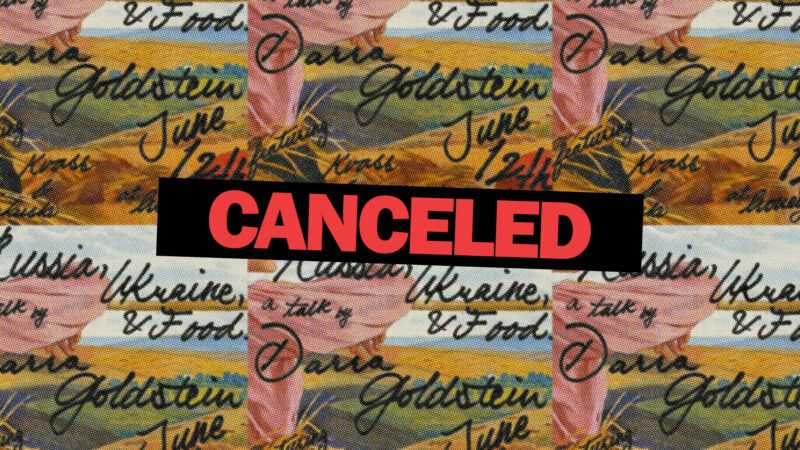Cancel Culture Deprives Brooklynites of Understanding How Putin Uses Food as a Political Weapon
When the Bushwick bar Honey's tried to host a “Russia, Ukraine, and Food" talk with food writer and academic Darra Goldstein, the angry mob shut them down.

Honey's, located in Brooklyn's Bushwick neighborhood, makes small-batch meads and sells them around the five boroughs. They source their grapes, sumac, juniper, and dandelion from the Hudson Valley and get honey from bees in the Fingerlakes region. They host community events, like ones held with food writer and Williams College professor Darra Goldstein to celebrate the release of her book Beyond the North Wind and the 25th anniversary of The Georgian Feast.
Honey's had planned another event with Goldstein called "Russia, Ukraine, and Food" for this past Sunday, replete with zakuski—hors d'oeuvres—and kvass—a fermented drink frequently made out of rye. That's when the cancelers came for them.
"In retrospect," Goldstein tells Reason, "the messaging was wrong."
"It should have been differently framed to emphasize a serious conversation about a serious subject, rather than presenting it as a talk and a tasting with good times for all," she says. But in reality, she'd "planned to talk about how Russia has historically used food as a political weapon, most brutally during the collectivization of the Ukrainian countryside in the 1930s that led to the devastating famine known as the Holodomor, which killed nearly 4 million Ukrainians." Goldstein adds that most Americans don't know about this history, but ought to understand that "[Russian President Vladimir] Putin's seizure of grain follows Stalin's savage playbook."
"I planned to talk about the difference between Stalin's localized famine and the global one that threatens to ensue today due to Putin's seizure of Ukrainian grain," adds Goldstein.
Nonetheless, a mob of netizens took offense and started accusing Goldstein of "profiteering" from the Russian war in Ukraine, ostensibly since the Instagram post announcing the event also mentioned her May-released book, The Kingdom of Rye: A Brief History of Russian Food.
"Those comments accelerated into IG stories and comments variously stating that I'm Russian, that I've made a career of promoting Russia and have been well paid for it by the Russian government, that I make money from my books (I wish!), that I'm opposed to Ukraine and don't know a single thing about it," says Goldstein. Her hunch is that most of the commenters have not read her books and that some people may have been already emboldened by her piece in The Brooklyn Rail on the recent wave of reputational destruction of all things Russian.
Honey's subsequently bent the knee to the mob and canceled the event. (They did not want to comment for this story.)
Following the Russian invasion of Ukraine in late February, Western institutions have been quick to sever ties with anyone deemed insufficiently disapproving of Putin or even facially connected to Russian culture. New York City's Metropolitan Opera and Carnegie Hall said they would not allow people to perform who have supported Putin in the past. Reason's Christian Britschgi detailed how such a cosmetic cleansing came for the sciences, with academic papers noting they'll refuse papers submitted by Russian scientists and universities and cutting ties with private Russia-based research bodies. Moscow Mules have been renamed Kyiv Mules (despite the fact that the drink was invented in New York in the '40s). Brighton Beach's grocery store, Taste of Russia, in Brooklyn, changed its name, as did Washington, D.C.'s Russia House in Dupont Circle and many other bars, restaurants, and grocery stores (some of which were subjected to vandalism in the wake of Putin's war).
Meanwhile, Disney and Warner Bros. have pulled theatrical releases to Russia; it's unclear how withholding cultural fare from Russia does much other than punish the Russian people, who may in fact be unsupportive of their government, for the sins of the tyrant they've been forced to live under. "A new McCarthyism is stalking America," wrote economist Tyler Cowen for Bloomberg back in March.
It's unsurprising that Brooklyn's intellectuals would be set off by an event with the word Russia in the title. But the mob's actions deprived curious city dwellers of a deeper understanding of how Putin's horrific tactics emulate Stalin's. Attending this event would probably have also served as a timely reminder of the evils perpetrated by Stalin and his collectivization program (something Reason devoted a fair portion of the December 2021 magazine issue to, since many people are easily swayed by Soviet revisionism or fancy themselves proponents of state seizure of private property).
Succumbing to public pressure, as Honey's did, is both cowardly and unlikely to heal the wounds of the aggrieved: The angry mob is infrequently satisfied by apologies and slow to extend mercy. Little is gained from bending the knee, while so much is lost.
"Somehow the cancelation infuriated people even more because they felt that they hadn't been sufficiently apologized to," says Goldstein. "Short of condemning me and my work, I don't know what would have satisfied them."


Show Comments (82)